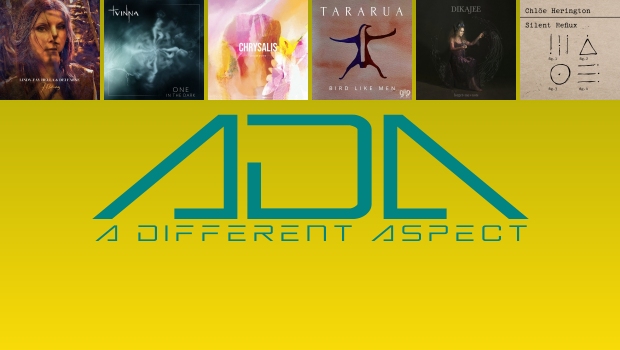Featured artists: Lindy-Fay Hella & Dei Farne | TVINNA | AVAWAVES | Tararua | Dikajee | Chlöe Herington (V Ä L V Ē) ||:
Celebrating ‘National Album Day’ TPA’s Nick Hudson and Bob Mulvey take a look at some recent releases in one of our periodic ADA (shorter reviews) updates:
• Lindy-Fay Hella & Dei Farne – Hildring
• TVINNA – One In The Dark
• AVAWAVES – Chrysalis
• Tararua – Bird Like Men
• Dikajee – Forget-Me-Nots
• Chlöe Herington (V Ä L V Ē) – Silent Reflux
It seems every day of the year is ‘National This Day’ or ‘International That Day’, but some of what is celebrated seems a little, well, trivial. Of course it stands to reason that with a vested interest in music, the UK’s National Album Day might be of more interest to The Progressive Aspect. This year National Album Day is on 16th October, and this year’s theme is “A Celebration of Women in Music”. There have been many fine releases this year featuring female talent, several of which TPA has reviewed. Let’s add a few more, shall we?
Nick Hudson
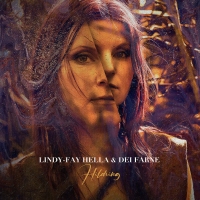
Hildring is scheduled for release on 26th November, the latest release under the always intriguing By Norse brand. By Norse is the boutique label established by Einar Selvik (Wardruna) and Ivar Bjørnson (Enslaved), initially to release their own music but which has steadily been releasing music from beyond that. Not that they had to look too far afield to find Lindy-Fae Hella, as she has been a member of Wardruna from its inception. Her vocals, therefore, will be familiar to those who have listened to that band, but this album with Dei Farne (Roy Ole Førland, Ingolf Hella Torgersen & Sondre Veland) is something quite different, and rather spectacular – albeit in a subdued and subtle way. The music of Hildring implies memories, myths and magic. This is the soundtrack to the other side of the looking glass. The familiar world made unfamiliar. The upside down. Indeed, there is even a song called Otherworld!
‘Hildring’ means mirage, and there’s something magically hazy about the music that makes it up. It sounds magnificently and carefully crafted, yet at the same time much of the album sounds spontaneous and improvised. The haziness is somewhat reflected in the cover art, and that cover art also provides an indication of the music within: ethereal and beautiful and soft, but with spikes and unexpected edges. There is a pop sensibility, but it’s a dark one, and the fusion of synthwave and folk conjures up something quite unique. Over the instrumentation floats Hella’s evocative voice, full of expression and experimentation – sometimes piercingly sharp, other times pleasantly soft. The whole is incredibly rhythmic and fluid, and overall gives a sound that feels natural and organic. Even when the rhythmic nature approaches a krautrock sound, it never feels mechanical, and this is quite a feat.
Similarly, despite my suggestion of the music being dark, it’s never sinister or threatening. As oxymoronic as it sounds, there is a lightness to the darkness, just as the music sounds both composed and improvised. It’s hard to describe the sense of improbability of the music, where it expresses contrasting ideas and themes simultaneously and without conflict. Dare I say magical once more? And yet, it does feel like suspending my sense of disbelief, embracing my sense of wonder, and accepting that the music of Hildring is inexplicable and magic. A mirage is essentially an illusion, and Hildring emphasises the illusory nature of our surroundings. There’s always so much more under the surface, hiding just out of sight or reach. Hildring takes me there, and I dare say it will take you too, if you give it a listen.
Nick Hudson
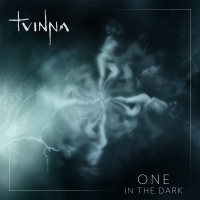
Another stunning release from By Norse. To be fair, I don’t think I’ve ever heard a dud from this label, but TVINNA is quite possibly my favourite yet from them. It is absolutely incredible, and every time I listen it is in awe. The album title should possibly be read as One (In The Dark), or (One) In The Dark, as it is the first of four chapters of a life. Each chapter describes one part of the life cycle, reflected in metaphor through one of the four elements. Thus we begin our journey through birth and water. Water makes sense, of course, because from the very first moment we are conceived into, we are dependent upon it – growing in amniotic fluid and exchanging blood with our mother. That blood is The Gore of the opening song, which was the first written by TVINNA. I’ll be honest, it’s the least impressive for me, but that doesn’t mean it’s an ineffective opening number. And, or course, it also means that the album only gets better from here.
The sound of TVINNA is hard to describe, as there is so much packed into it, including quite possibly a kitchen sink or two. There are elements of folk and industrial, pop and metal, and the whole sounds both incredibly ancient and completely modern and contemporary. The music pounds in waves that alternately wash and crash over the listener. The music crescendos and climaxes, leaving the listener sometimes floating and drifting, and sometimes fighting and drowning. When I first heard the album I was taken aback by just how heavy it is in places. I was not expecting that at all, based upon The Gore. I’m reminded of bands as diverse as Sigur Rós, Kælan Mikla, Tool and Portishead. One In The Dark is, indeed, dark. It’s dramatic, deep, and at times very dark. The album touches upon the sad truth that not every pregnancy leads to a live birth, and where this is the case, the music is distressing, caught between the sounds of anger and grief. Inside – The Dark can be hard to listen to, and is rather harrowing.
The way I hear the album, which is not necessarily the way TVINNA intends it (so apologies if I have this wrong), the first four tracks occur before birth, and then Inside – The Dark and Sunna present two potential outcomes, the latter therefore far more pleasant sounding than Inside – The Dark, as the foetus still lives. Tides is an absolute banger, and completely unexpected, full of positivity and disco fervour. Finally, with Partus, we reach birth. Our journey is almost at an end, and this is a surprisingly subdued number given it is where the album has been heading since the beginning, though in no way anti-climactic. The album ends with Skymning, which continues the quieter and more peaceful vibe of Partus, reflecting the peace and bliss any parent knows when a child is safely born after all the travails of pregnancy.
Bob Mulvey
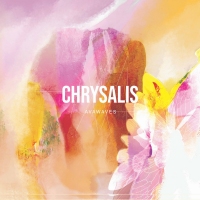
AVA or as they are now known AVAWAVES released their stunning debut, Waves back in 2019. Two years on and violinist/composer Anna Phoebe and pianist/composer/producer Aisling Brouwer return with, it has to be said, an equally stunning second album. Once again they have delivered music which is achingly beautiful and imbued with a sense of calm and serenity. As with their debut, the ten tracks comprising Chrysalis see this accomplished duo immerse their principal instruments, piano and violin, within an exquisite, eddying tapestry of rich and ethereal sounds, transporting the listener to a nirvanian state.
AVAWAVES describe their sound as being “rooted in cinematic narratives evoking emotional journeys of the heart and mind”. A narrative they amply backup throughout the album and a listen to album’s first single and title tune (featured below) will substantiate this and my my rather bold opening statement. Like an emerging butterfly, Chrysalis opens with rippling piano, supported by deep guttural bass, before swathes of lush strings fill the air. And as the track unfolds, lo-fi kick drum punctuates, accompanied by winsome layers of evocative violin and subtle synthy ornamentations complete the transformation. A truly wonderful piece and a fabulous opening gambit.
Chrysalis is a wonderfully cohesive album, and a testament to Aisling Brouwer and Anna Phoebe as the album was written remotely during the pandemic. There are a number of YouTube clips of the duo performing tracks from their debut ‘live in isolation’ and the empathy between the two is ever so evident and this true partnership is obvious throughout this new release.
I’ve chosen to undertake AVAWAVES Chrysalis as an ADA as I wanted the publishing of the review to coincide with National Album Day’s “A Celebration of Women in Music”. The only downside is, by nature of TPA’s ADA format, is it restricts the word count and doesn’t allow me to wax lyrical about each and every track. Suffice to to say that each piece has it’s own distinct voice and charm… and talking of voices Chrysalis‘ only song the wonderfully haunting Midnight Bird, featuring vocalist YVA.
Across the album Anna & Aisling combine their classical training to create music that transcends genre. It is mesmerising, intoxicating and totally refreshing. A true epic and a befitting release to celebrate two creative talents on National Album Day.
Nick Hudson
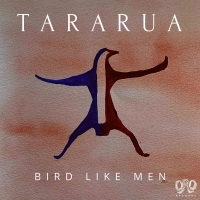
Last year, two of my favourite albums were Pōneke by Ruby Solly, and Nau mai e kä hua by Ariana Tikao and Al Fraser. Tararua sees all three come together, along with Phil Boniface, who is the only member not to play taonga puoro (the traditional musical instruments of the Maori people of Aotearoa New Zealand). The sound of Tararua may sound simple: the taonga puoro augmented by the cello and double bass of Solly and Boniface, and the vocals of Solly and Tikao. Yet there is a surprising depth and breadth to the sound – or perhaps not so surprising, for those who have heard how much variation can come from taonga puoro. The coming together of Maori and Pakeha instruments and language is a joy to hear. Two different worlds and cultures in harmony making a new sound that is neither and is both.
Some of the most interesting sounds that can be generated by taonga puoro are those of birdsong (which I highlighted in my review of Solly’s Poneke last year), and they take centre stage for Tutumaiao which provides an excellent overview of the wonderful blend of musical styling Tararua pulls together to make their unique sound, and acts almost as a title track, given the inclusion of the Bird Like Men in its lyrics. The music of Tararua is intimate and evocative, and despite the use of traditional Maori and classical Western instruments, completely contemporary. This is a modern, progressive take on the traditional music of the members, that sounds both ancient and timeless. It is often playful, sometimes solemn, and never boring.
The vocals of Solly and Tikao are evocative and varied, taking in waiata (song), karakia (chant) and purakau (story), giving each song a quite different feel. When the two sing in close harmony the sound is rich and full. But as powerful and strong as the vocals are (and they are), they are just one layer woven into the lush soundscapes of Bird Like Men, and I use woven deliberately. The songwriting is beautifully crafted, and the stands that make it up (taonga puoro, strings and voice) are all carefully woven together like matatara. We have been climbing and ascending (Pikipiki) since the album began, and from the Southern Lights of Tūtūmaiao, the album has an appropriately celestial final number with lead single, Puaka. An ending that is also a new beginning, flowering and blossoming, as Puaka (or Rigel as Pakeha might know it) heralds the new year for some Kiwi. What comes from this new beginning is something I will be very excited to hear.
Nick Hudson
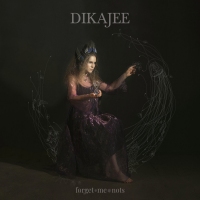
Dikajee professes to be a citizen of the world, ageless and nationless. It’s a little optimistic and utopian, but an entirely admirable sentiment to hold. Consequently, her debut album bounces across time and space like Peter Gabriel’s Big Blue Ball, effortlessly taking in influences from varying eras and cultures and creating a rich and beautiful tapestry of sounds. The album was recorded across half a dozen countries, from where the band and guest soloists hail. But no matter who is playing, what grabs the attention of the listener, and holds it fast, are the vocals of Dikajee herself. I guess I was expecting something sort of fragile, delicate, ethereal and almost naïve, but instead Dikajee has a bold and powerful voice. Her stated influences are Kate Bush and Björk, and while I can hear hints and notes of those, I’m also reminded of such strong singers as Stevie Nicks and Maartje Dekker.
Forget~Me~Nots begins with Forest, which almost lulls the listener into a false sense of security. It’s a quite beautiful and peaceful song, which belies the strength and power that Dikajee is capable of, and shows throughout the remainder of the album. Nevertheless, it beguiles, and is almost impossible to resist. Its melodies also linger long after it has finished, and many is the time I have found myself humming this ear worm of a tune. The following Lily of the Valley is achingly and hauntingly atmospheric and evocative. João Filipe (of Amber Foil) provides so many “beautiful noises” to this song that they could easily over-power a lesser singer, but Dikajee simply soars over the top of it all. Another example of her ability to be front and centre, no matter who else she is sharing the stage with, is Dead Garden, featuring Guillaume Bernard (Klone). Quite frankly, Dikajee’s vocals are simply stunning.
The following Misery crashes into being wonderfully. There are so many interesting sounds in this instrumentation (some of these possibly once again “beautiful noises” from João Filipe). Scriptwriter surprises with its sound. As much as each track has been different from the last, Scriptwriter deviates the most. I’m not sure if it’s because of this, but it’s probably my least favourite song on the album – which is, otherwise, as per the title of the next song, Glorious Beautiful Magical. And, by the way, this is a fabulous song that is probably my favourite, and which features some incredible violin, saxophone and (my favourite instrument) bass clarinet, along with some of Dikajee’s most impressive vocals. How do you follow that? Well, with a three part mini-epic, featuring some superb and sublime piano (and bagpipes!) from Fiona Rüggeberg (TVINNA). Speaking of three parts, For~get~Me~Nots is the first album of a trilogy, and I can’t wait to hear the next chapter.
Nick Hudson
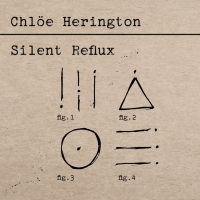
This album has been a long time in gestation – some fifteen years or so! But if you were waiting for it, I don’t need to tell you about it as you no doubt already possess it. Perhaps you’ve even acquired the necessary ingredients to smell the album as you listen (I kid you not – this album has an olfactory element designed to enhance listening, should you wish to follow the instructions contained with the CD). But honestly, there’s so much going on here that I’m content to forgo the multi-sensory experience and just listen. With a veritable who’s who of local avant garde artists from the likes of Knifeworld, Guapo and Chrome Hoof (and other such inter-related acts that Herington is associated with), there is a huge pool of talent. A dream team, if you will, which is entirely appropriate for an album composed from dreams. And as this is the soundtrack to a dreamworld, you can forget any conventional musical progression, as instead Silent Reflux follows the structure of dream logic.
The four main pieces (or figures, represented graphically on the cover) are inspired by four of Herington’s recurring childhood dreams. Events within dreams are often not bound by the same laws of physics and norms of social convention as those of day to day life. Thus, within the four figures, the most fantastic and unlikely scores play out as in a dream. The nonsensical logic one possesses while dreaming makes perfect sense until one wakes up, but with Silent Relux we get to hear it (and smell it, yes) awake, in all its non-linear and irrational glory. For some listeners, this could prove challenging, but I can’t get enough, and am somehow forever surprised and disappointed when it ends. Of course, it helps that I love the sounds of bassoons, saxophones and clarinets, of which there are plenty here to sink into and drift away. And as well as more conventional instruments such as piano, guitar and drums, there is all manner of percussion (including glockenspiel), saz and oud, cellos, viola and violin. A veritable cacophony or cornucopia, depending on your preference.
Reflux is the flow backwards through a vessel or valve (or V Ä L V Ē), and so Silent Reflux seems a wonderful title for an album that takes us back in time, not just to Herington’s recurring dreams of childhood, but to splendidly outrageous music vaguely reminiscent of ’70s avant garde artists such as Henry Cow – or being removed out of the flow of time completely. It’s all very wibbly wobbly timey wimey stuff, and (at least, for me) exuberantly joyful and playful. The three shorter pieces interspersed among the four dream figures are just as enjoyable, though sonically very different. Interestingly, these are the three tracks that have had videos created for them, but I’m guessing this is so listeners can visualise the dreams in their own way, as Herington desires each listener “to have a singular and individual experience at home”. I don’t know about singular, though, as this is one series of dreams I don’t mind recurring again and again…

